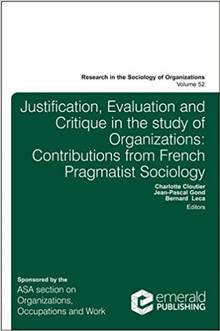Justification, Evaluation and Critique in the Study of Organizations : Contributions from French Pragmatist Sociology
Charlotte Cloutier, Jean-pascal Gond and Bernard Leca
Éditeur : EMERALD GROUP PUBLISHING LIMIT
ISBN papier: 9781787143807
Parution : 2017
Code produit : 1345800
Catégorisation :
Livres /
Gestion /
Gestion des ressources humaines /
Comportement organisationnel
Formats disponibles
| Format | Qté. disp. | Prix* | Commander |
|---|---|---|---|
| Livre papier | En rupture de stock** |
Prix membre : 183,42 $ Prix non-membre : 193,07 $ |
*Les prix sont en dollars canadien. Taxes et frais de livraison en sus.
**Ce produits est en rupture de stock mais sera expédié dès qu'ils sera disponible.
Description
The papers included in the volume explore how mobilizing Boltanski and Th#65533;venot's EW framework helps address questions regarding the premises and dynamics of agreement and disagreement in coordinated action, both within and across organizations, and by so doing, help advance our understanding of organizational processes more generally. The book is organized into four sections, each with contributions that address one of the four core theoretical objectives around which the volume is structured (1) to clarify how individuals manage the contradictions and compromises inherent to organizational pluralism; (2) to look at organizations critically by unpacking the roles of rhetoric and justification in the practice of critique; (3) to reconsider valuation and evaluation in organizations; and (4) to push the boundaries of the EW framework. These four objectives provide a scaffolding that helps further embed the framework in our contemporary thinking about organizations.























